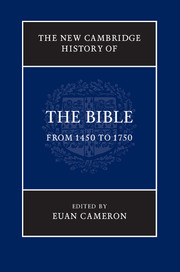Book contents
- Frontmatter
- Contents
- List of figures
- List of contributors
- Preface
- List of abbreviations
- Introduction
- PART I RETRIEVING AND EDITING THE TEXT IN EARLY MODERN EUROPE
- PART II PRODUCING AND DISSEMINATING THE BIBLE IN TRANSLATION
- 7 Publishing in print: Technology and trade
- 8 Latin Bibles in the early modern period
- 9 The Luther Bible
- 10 Bibles in the Dutch and Scandinavian vernaculars to c. 1750
- 11 German Bibles outside the Lutheran movement
- 12 Bibles in French from 1520 to 1750
- 13 English Bibles from c. 1520 to c. 1750
- 14 Bibles in Central and Eastern European vernaculars to c. 1750
- 15 Bibles in Italian and Spanish
- PART III PROCESSING THE BIBLE: COMMENTARY, CATECHESIS, LITURGY
- PART IV THE BIBLE IN THE BROADER CULTURE
- PART V BEYOND EUROPE
- Afterword
- Select bibliography
- Select Bible bibliography
- Index
12 - Bibles in French from 1520 to 1750
from PART II - PRODUCING AND DISSEMINATING THE BIBLE IN TRANSLATION
Published online by Cambridge University Press: 05 August 2016
- Frontmatter
- Contents
- List of figures
- List of contributors
- Preface
- List of abbreviations
- Introduction
- PART I RETRIEVING AND EDITING THE TEXT IN EARLY MODERN EUROPE
- PART II PRODUCING AND DISSEMINATING THE BIBLE IN TRANSLATION
- 7 Publishing in print: Technology and trade
- 8 Latin Bibles in the early modern period
- 9 The Luther Bible
- 10 Bibles in the Dutch and Scandinavian vernaculars to c. 1750
- 11 German Bibles outside the Lutheran movement
- 12 Bibles in French from 1520 to 1750
- 13 English Bibles from c. 1520 to c. 1750
- 14 Bibles in Central and Eastern European vernaculars to c. 1750
- 15 Bibles in Italian and Spanish
- PART III PROCESSING THE BIBLE: COMMENTARY, CATECHESIS, LITURGY
- PART IV THE BIBLE IN THE BROADER CULTURE
- PART V BEYOND EUROPE
- Afterword
- Select bibliography
- Select Bible bibliography
- Index
Summary
Introduction
In France, the period from the 1520s to 1750 saw the appearance of Protestant Bibles, in French, with or without notes, and often published in very difficult circumstances. It was also what has been called the ‘Golden Age of the Catholic Bible’, with the publication of many works inspired by Port-Royal and circles close to it.
The Protestants
It was around the Bible that the Protestant identity was, to a large extent, forged, in France as elsewhere. Many factors – the new demands and perspectives introduced by the Renaissance and humanism, the emergence of printing, the rise of the bourgeoisie, the politico-religious battles and the questioning of the role of the clergy – combined to explain the rapid appearance of Bibles in French which, while they cannot yet be called ‘Protestant’, nevertheless represented a break with the medieval past. The concern of the authors was now to establish the text and to translate it into the vernacular for the laity, sometimes with the addition of explanatory notes. The successive editions of the Protestant Bibles, some more open to the contemporary world, others more traditional, attest to the changing mentalities and perspectives of their translators.
Three periods can be distinguished: from the 1520s to the end of the sixteenth century; Protestant Bibles from 1598 to the Revocation of the Edict of Nantes (1685); and from the Revocation to around 1750.
From the 1520s to the end of the sixteenth century
In 1523 there appeared, as a preliminary to a complete edition of the Bible, the Nouveau Testament of Jacques Lefèvre d’Étaples; the translation was based on the Vulgate, but with some corrections from the Greek. After that, the next important stage was the publication in Antwerp, on 10 December 1530, of the same author's The Holy Bible in French, translated according the to pure and complete translation by St Jerome …, with extensive commentaries; it was republished in 1534. Lefèvre d’Étaples emphasised the prime role that the Bible, ‘rule of life and rule of salvation’, should play in the Christian life; 1534 was also the year of publication of Luther's complete Bible in German, followed, in 1536, by the first edition of Calvin's Institutes of the Christian Religion.
- Type
- Chapter
- Information
- The New Cambridge History of the Bible , pp. 285 - 304Publisher: Cambridge University PressPrint publication year: 2016
- 2
- Cited by

